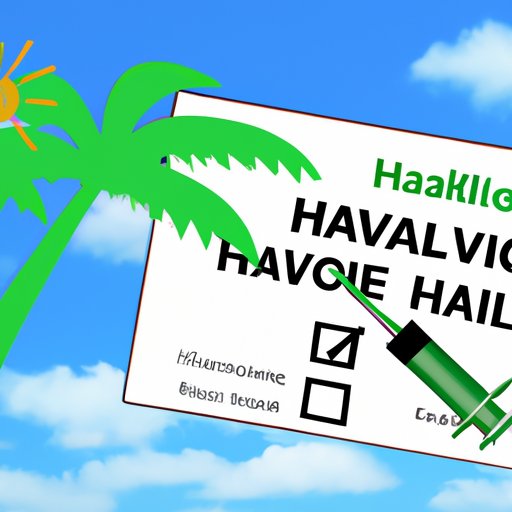
Introduction
Hawaii, with its stunning beaches, crystal-clear waters, and natural beauty, has long been a popular destination among travelers. However, due to the COVID-19 pandemic, travel to Hawaii has become more complicated and restricted. As of September 2021, Hawaii has one of the lowest COVID infection rates in the United States. This article provides a comprehensive guide to whether you need to be vaccinated to go to Hawaii, exploring the current COVID-19 requirements and considerations.
Current COVID-19 Vaccination Requirements for Travel to Hawaii
Since June 2021, visitors to Hawaii have been required to provide proof of full vaccination before they can bypass the state’s quarantine rules. According to the official Hawaii state website, visitors can only travel to Hawaii without quarantine if they have been fully vaccinated in the United States (including US territories) or another country. To be fully vaccinated, travelers must receive either two doses of the Pfizer or Moderna vaccine or one dose of the Johnson & Johnson vaccine at least 14 days before arriving in Hawaii. Visitors must upload their vaccination record to the state’s Safe Travels Hawaii program and present their vaccination card upon arrival.
The Hawaii state government is constantly updating its COVID-19 policies in response to the evolving situation. As of September 2021, Hawaii is considering the addition of a vaccine passport program that would allow vaccinated visitors to bypass pre-travel testing requirements.
Pros and Cons of Getting Vaccinated for Travel to Hawaii
Vaccines have been a controversial topic since the COVID-19 outbreak. While some people welcome the vaccine as a way to protect themselves, others are hesitant or even resistant. However, getting vaccinated can have a significant impact on travel to Hawaii. One of the main advantages of being fully vaccinated is that it allows visitors to bypass Hawaii’s strict quarantine rules. This means that you can enjoy your Hawaii vacation without the need to self-isolate for 10 days.
On the other hand, some people are concerned about the potential side effects of the vaccine and the long-term consequences of getting vaccinated. Others may have a fear of needles or may prefer other methods of prevention, such as wearing a mask and practicing social distancing. Ultimately, the decision to get vaccinated is a personal one that should be made after careful consideration of the benefits and risks.
Navigating the Vaccination Process for Travel to Hawaii
If you decide to get vaccinated for your Hawaii trip, the next step is to navigate the vaccination process. The first thing you should do is to schedule an appointment with a vaccine provider. You can check the official vaccine locator developed by the US government to find a provider near you. After receiving your vaccine, you should make sure to keep your vaccination card in a safe place. You will need to upload a copy of your vaccination card to the Safe Travels Hawaii program at least 24 hours before your flight departs.
In addition to getting vaccinated, you may need to prepare other documents or take additional steps before your Hawaii trip. For example, you may need to schedule a COVID-19 test before your flight if you are not fully vaccinated, or if you are traveling with a child under 12 years old who cannot be vaccinated yet. You can check the Hawaii state website for the latest travel requirements and restrictions.
Different Perspectives on the Hawaii Vaccination Requirement
Since the Hawaii vaccination requirement was introduced, there have been different perspectives and opinions on its effectiveness and fairness. Public health officials generally support the vaccination requirement as a way to protect Hawaii’s residents and visitors from COVID-19. However, some travel industry experts and business owners are concerned about the potential negative impact on Hawaii’s tourism industry, which is a vital part of the state’s economy. At the same time, some residents of Hawaii are worried that visitors who are not properly vaccinated may bring new variants of COVID-19 to the island, putting the local community at risk.
Frequently Asked Questions about the Hawaii Vaccination Requirement
Here are some of the most frequently asked questions about the Hawaii vaccination requirement:
- Who is exempted from the Hawaii vaccination requirement?
- How can I verify my vaccination status?
- What happens if I arrive in Hawaii without proof of vaccination?
Children under 12 years old, people who have a medical condition that prevents them from getting vaccinated, and travelers who are only transiting through Hawaii are exempted from the vaccination requirement. However, they may still need to take a COVID-19 test before departure or upon arrival in Hawaii.
You can verify your vaccination status by uploading your vaccination card to the Safe Travels Hawaii program. Make sure to bring a physical copy of your vaccination card in case of any technical issues.
If you do not have proof of vaccination, you will need to take a pre-travel COVID-19 test and quarantine for 10 days regardless of the test result. Quarantine rules may vary depending on your accommodation and location in Hawaii.
Conclusion
Whether you are planning a Hawaii vacation or just curious about the current COVID-19 requirements, understanding Hawaii’s vaccination policy is important. By following the latest guidelines and preparing the necessary documents, you can have a safe and enjoyable trip to Hawaii. Remember to consult official sources and stay informed about the evolving situation. With some planning and preparation, you can make the most of your Hawaii vacation and protect yourself and others from COVID-19.





